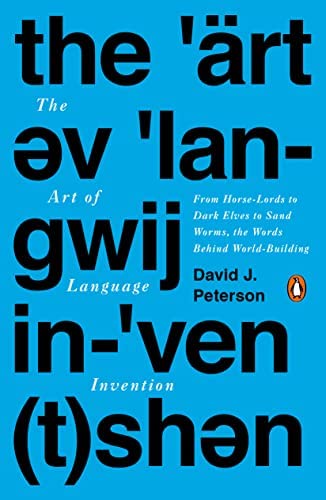Media ranging from Star Wars and Game of Thrones (GOT) to Despicable Me and Thor: The Dark World depict species communicating in foreign tongues, but what exactly are they speaking? Who fabricates these languages? Languages such as Valyrian (GOT) and Klingon (Star Trek) are called “conlangs,” short for “constructed languages.” Sometimes, they’re crafted by sound designers or directors. Other times, language specialists are specifically hired to craft languages or written alphabets. Writer and conlanger David J. Peterson compares inventing languages to drawing a human. While it is relatively easy to create something that resembles a human, the challenge comes with realism; making a functional language that resembles a pre-existing language has its obstacles. We see these languages everywhere, whether it be for laughs like Pig Latin and Gibberish or to make the experience more immersive.
In his book The Art of Language Invention: From Horse-Lords to Dark Elves to Sand Worms, as well as his YouTube content, Peterson goes into detail about his journey into the world of conlangs; Peterson realized how developed these languages could be and learned about existing conlangs like Klingon. Since then, he has come to create languages and scripts for GOT, Defiance, Thor: The Dark World, Penny Dreadful, and The 100.
This poses a question: Could anyone come to learn and speak one of these languages as if it were one of our own? What are the applications of conlangs outside of their universes? The complication is comprehending their sentence structures, as well as piecing together the words and phrases that exist only within the context of that world. While audiences have crafted dictionaries with translations for Huttese or Klingon, these words can be misinterpreted or used in an incorrect context based on cultural differences.
Languages can be either a priori, meaning completely original, or posteriori, meaning they take parts of other languages in order to create a new one. Returning to Peterson’s metaphor, some films take advantage of posteriori languages in order to emphasize the lack of realism in its dialect for humor. This is exemplified within Despicable Me’s Minionese; while a combination of Spanish, Italian, Tagalog, French, and other foreign languages, it also includes an abundance of English food names and English cognates. In this way, children are able to recognize it as a foreign language, but still giggle and even understand some basic phrases like “bello!” (hello!) and “papoi” (toy).
In the same way audiences can sense tone in a piece of literature, a creator’s intent can become clearer simply by recognizing a species’ speech patterns. If a dialect is meant for a more humanoid species, it may be more likely to utilize posteriori. However, more animalistic species such as Wookies (Star Wars) are not meant to be perceived as human, and that is reflected in Shyriwook’s undgrowl-esque noises, which is actually dangerous to human vocal chords entirely. It is clear that many choices regarding conlangs serve deliberate purposes, both for audiences and within the world itself.
As avid scholars of the English language, we would benefit from coming to understand the roots of other languages—even if they exist in a context like conlangs do. The purpose of language is to communicate, and thus conlangs can serve as much purpose in their worlds as ours do in ours.
 Zoe Talbot
Zoe Talbot
Associative Student Representative, Eastern Region, 2022-2023
Alpha Epsilon Alpha Chapter, Vice-President
The College of New Jersey, Ewing, NJ
Sigma Tau Delta
Sigma Tau Delta, International English Honor Society, was founded in 1924 at Dakota Wesleyan University. The Society strives to
- Confer distinction for high achievement in English language and literature in undergraduate, graduate, and professional studies;
- Provide, through its local chapters, cultural stimulation on college campuses and promote interest in literature and the English language in surrounding communities;
- Foster all aspects of the discipline of English, including literature, language, and writing;
- Promote exemplary character and good fellowship among its members;
- Exhibit high standards of academic excellence; and
- Serve society by fostering literacy.
With over 900 active chapters located in the United States and abroad, there are more than 1,000 Faculty Advisors, and approximately 9,000 members inducted annually.
Sigma Tau Delta also recognizes the accomplishments of professional writers who have contributed to the fields of language and literature.
Sigma Tau Delta accepts submissions to our blog, WORDY by Nature, throughout the year from all membership categories (students, Advisors, and alumni). If you are interested in submitting a blog, please read the Suggested Guidelines on our website to check if your topic is a good fit and to verify your article is correctly formatted. Email any questions and all submissions to: [email protected].







Add Comment